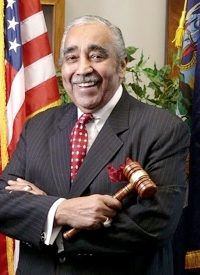
It seems that Charles (“Charlie”) Rangel (D-N.Y.) is seeking another two years in the House of Representatives. Although as yet he has made no formal announcement, he has filed a statement of candidacy for what would be his 22nd consecutive term.
Rangel’s reputation has suffered from a number of serious ethical charges over the years. The House Ethics Committee found him guilty of 11 out of 13 of those allegations. After his reelection last November, the House censured the long-time congressman from Harlem — a move not taken lightly by the lower chamber. In the nation’s history, the House has censured only 23 of its members (though it should be noted that in a few cases, the more rigorous punishment of expulsion was applied instead).
The last censure before Rangel’s occurred 28 years previously. Congressman Gerry Studds (D-Mass.) and Congressman Daniel Crane (R-Ill.) were both censured for sexual misconduct — Studds for carrying on a longtime homosexual affair with an underage House page, and Crane for having sexual relations several times in his office with a female page. Though Crane expressed contrition to his fellow representatives, Studds turned his back to the House chamber as the charges against him were read. Crane’s political career was effectively ended by the censure, although Studds continued to win re-election in Massachusetts.
Rangel’s misconduct was not sexual, but rather of the sort which borders on the criminal. His attitude after the censure vote last December was defiant, reminiscent of that of Studds. Brushing off colleagues who sought to comfort him, he accused the House of hypocrisy, retorting that what he did was no different from what many other members had done. Whether that was true or not, Rangel’s ethical violations had been an open secret for years, though no action had previously been taken.
Rangel is now a disgraced, 80-year-old member of the House. Furthermore, he is a member of what is now the minority party. It is unclear what he could accomplish with another term in Congress (assuming, of course, that no other ethical issues regarding him arise).
Nearly all of Rangel’s adult life has been spent as an elected official. Prior to his election to Congress, he served in the New York State Assembly. His friend Governor Nelson Rockefeller even arranged for him to be the nominee of both the Democrat and the Republican parties, assuring his election.
Charlie Rangel, a combat veteran of the Korean War who was awarded the Bronze Star for valor for saving his platoon, could have had a much different life. Astute and thoughtful (albeit with a definite political agenda), of an affable nature, he might have enjoyed a successful career in any number of private sector jobs.
What happened to Rangel was political power in Washington — a dangerous addiction.
Rangel in 1970 won the House seat long held by Adam Clayton Powell, who was first elected in 1944 and never lost an election until 1970 — 36 straight years, almost as long as Rangel has held the same House seat. Like Rangel, Powell could “work” with Republicans. Charles Hamilton, a black professor at the University of Columbia, stated that the reason that Powell endorsed Dwight Eisenhower in the 1956 presidential election was because Ike had promised to drop the criminal investigation of Powell for tax fraud and kickbacks.
Powell, like Rangel, ran into increasingly serious ethical problems involving abuse of power, and was finally ousted from the House by a vote of 307 to 116. He still had clout with his constituents, however, and after his expulsion, won the special election to fill his seat. Powell then sued the Speaker of the House for the right to be seated, and was able to get the Supreme Court to rule that the 1967 vote of exclusion could not affect his special election victory. After returning to the House, Powell seldom showed up for work. This inattention to his duty in Congress accomplished what years of unsavory behavior, including a formal expulsion from the lower chamber, could not: Powell was defeated — by young Mr. Rangel.
What sort of representation in Congress have residents of Harlem had since the Second World War? They have had two likeable, smooth, corrupt, self-serving politicians who have lined their pockets and abused the prerogatives of their office.



